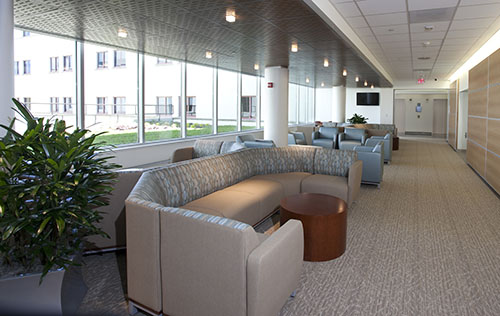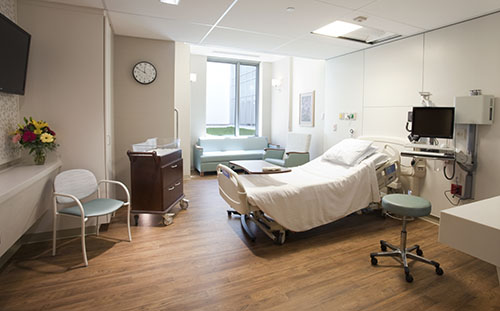The nursery is ready, the car seat is installed, and you’re stocking up on sleep knowing it may not be easy to come by in the near future. The weeks leading up to delivering a baby are full of excitement, last-minute tasks and, of course, questions.
One question you can check off that long list of yours is what to expect in the Chester County Hospital Maternity Unit. While the basics of most maternity units are similar — delivery, recovery and precious moments with your baby — our goal at Chester County Hospital is to make this time as special and seamless as possible for mom, baby and anyone else involved.
.ashx?h=340&w=650&la=en)
Debbie McMahon, RN, has been a part of the hard-working community of healthcare professionals in the Chester County Hospital Maternity Unit for nearly 22 years. Now known as the Mother and Baby Pavilion, "It’s a wonderful community," she says. "Many, many times, patients will say, 'I was born here.'"
In addition to a tight-knit and supportive community, the unit offers convenience. Both the Chester County Hospital Labor and Delivery Unit and the Chester County Hospital Mother and Baby Pavilion are located on the second floor of the new Lasko Tower, right next to the Moore Neonatal Intensive Care Unit.
As you pack your hospital bag, map out the quickest route to the hospital, and prepare for your baby's entrance to the world, take the time to learn a little more about what you can expect in the Chester County Hospital Mother and Baby Pavilion.
Getting Oriented in Labor and Delivery
Whether it's losing your mucus plug, your water breaking or contractions that send you to the hospital, you have one goal — to deliver your baby.
The Chester County Hospital Labor and Delivery Unit (L&D Unit) consists of ten birthing suites, each equipped with the latest state-of-the-art technology to care for you and your baby during delivery. It also has two surgical suites and recovery rooms right next door, should a cesarean birth (C-section) become necessary.
Upon entering the unit, your care team will get to work, starting with making sure you are comfortable and checking how far along you are in labor. Your care team in the L&D Unit will include labor and delivery nurses, your obstetrician, and an anesthesiologist.
As for your own support circle, due to COVID-19 restrictions, moms are currently allowed only one support person in their room. That person must remain consistent, meaning you can’t switch off from one person to the next.
"After patients are oriented to the room, typically the nurses will also ask what kind of delivery they were hoping for. Were they hoping for a natural delivery? Were they planning on an epidural?" McMahon says.
An epidural — officially known as an epidural block — is a medication given through a tube that’s placed in your lower back, and it’s the most common kind of pain relief for delivery in the United States. Epidurals cause some loss of feeling in the lower areas of your body (while you remain completely awake and alert), helping you push your baby through the birth canal.
Keep in mind, as McMahon explains, things can always change. If you plan for a natural birth but decide you want an epidural, you can always ask for one at any time.

Waiting For — and Delivering — Your Baby
Once you get settled, the waiting game begins. While Chester County Hospital birthing suites are all equipped with TVs, McMahon also suggests packing anything that might make this waiting period more comfortable, such as headphones to listen to music or your favorite podcast, a book to read, or a set of playing cards.
Of course, it might be tough to focus on much else other than your labor. McMahon recommends two tools to help you feel comfortable and promote labor — a peanut ball (which is provided by Chester County Hospital) or a birthing ball (which you can bring from home).
A peanut ball is simply a large peanut-shaped ball, and it’s placed between your legs to help open up the pelvic outlet (the opening in your pelvis). These are often used for moms who need to remain in bed, such as if you have an epidural or you’re too tired to move around.
A birthing ball is a repurposed exercise ball. These large inflatable balls can help move your baby down into the pelvis, speed up dilation, and even manage pain. You can use it in different positions, such as sitting on the ball and rocking back and forth or leaning against the ball while it’s placed on your hospital bed.
Welcoming Your Baby into the World
Eventually, the time will come to welcome your baby into the world. “After the birth, babies are placed on the mother’s chest, and we encourage them to do skin-to-skin for a good hour,” explains McMahon. "We give mom, support person, and baby time for bonding during that first hour."
At Chester County Hospital, this hour is called The Welcome Hour, and it helps your baby transition to their new environment as well as promote bonding. Skin-to-skin contact can also regulate your baby’s heartbeat, breathing, temperature, and blood sugar.
For breastfeeding mothers, The Welcome Hour is an opportunity to start identifying feeding cues. Babies who breastfeed in that first hour or so of life often have success later on with breastfeeding.
Afterward, your baby will be weighed, measured, and evaluated. Then, you and your baby will be escorted to your next stop — the Chester County Hospital Mother and Baby Pavilion.
The Move to Mother and Baby Pavilion
The Chester County Hospital Mother and Baby Pavilion is a place to recover, relax, and bond with your new baby. In your private room, there’s a sofa that converts to a bed for overnight visitors, European-style bathrooms, and plenty of natural sunlight.
Your room also comes with some new additions to your care team — postpartum nurses, lactation consultants, aides, and case management professionals, as needed. Of course, your obstetrician and pediatrician will also remain integral to your and your baby’s care.
Your care team will give both you and your baby a full head-to-toe assessment. Your baby will also be offered:
- A vitamin K shot, which ensures they have enough vitamin K and prevents bleeding complications
- A hepatitis B shot, which protects your baby against the serious and contagious disease, hepatitis B
- Erythromycin eye ointment, which is used to prevent bacterial infections in the eyes of newborns
As for nourishment, you can enjoy three meals a day (including an a la carte breakfast). You can also order items like salads, burgers, and pasta at any time. There’s a nutrition center, equipped with drinks, snacks, and a full-size refrigerator in case you decide to get food delivered.
Moms are encouraged to keep babies with them as much as possible to promote bonding. That way, you — and your support person, if applicable — can become comfortable caring for your newborn with the support of nurses nearby. This philosophy is a part of our Baby-Friendly Initiative, a global initiative to improve the care of pregnant women, moms, and babies.
There is a fully-equipped well baby nursery and around-the-clock pediatrician coverage to handle any medical needs that your baby has.

Learning to Care For Your Baby
One last — but critical — component of your time in the Mother and Baby Pavilion is centered around education. Whether you’re a new parent or you have plenty of experience, this is the perfect time to brush up on parenting skills, including making sure your baby remains safe.
CCH nurses will provide you with videos, pamphlets, and the New Beginnings book. These provide information on topics from postpartum recovery to breastfeeding to when to contact a healthcare professional. They’re also full of easy-to-use QR codes that direct you to other trustworthy resources.
“There's a lot of information and teaching that has to happen,” explains McMahon. “I think we do a really good job of getting people prepared to go home with their infants when the time comes.”
A Lifetime of Health and Happiness
The time you spend and the memories you create in the Chester County Maternity Unit will last a lifetime — but it’s only just the beginning.
Welcoming a baby into the world is an exciting and sometimes overwhelming experience. By providing you with plenty of support and resources, our aim is to make you and your baby’s transition seamless, joyful, and full of love.
Do you have questions about what to expect in the Chester County Maternity Unit? Call 610-738-2300 to connect with the Chester County Hospital Obstetrics and Gynecology Department or Find a Doctor Near You.
Related Information from Chester County Hospital: